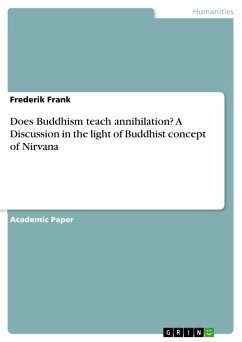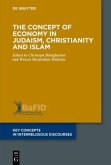Academic Paper from the year 2016 in the subject Theology - Miscellaneous, grade: 1,0, The University of Hong Kong, course: Life and Buddhism, language: English, abstract: In comparison to e.g. Christianity and its concept of Heaven and Hell, Buddhism does not give a concrete positive description of Nirvana, since it lies beyond what human language is able to explain. Buddhism mostly circumscribes Nirvana by saying that it is the absence of suffering and the exit of the cycle of rebirths. Therefore, by interpreting Nirvana, the final goal of Buddhism, without further knowledge, one could tend to believe that Buddhism aims for the annihilation of oneself.In order to analyse whether this statement is correct, I will provide a more in depth understanding of what Nirvana is, how Buddhism deals with the identity or the "self" (Anatta) of an individual and in what way this is linked to the cycle of rebirths.This goal of the essay with regards to content will be achieved by firstly clarifying the underlying principle of Nirvana and how it is imbedded into Buddhist teaching. Secondly, by taking into account various literature and reflecting on these, I will elaborate on the human language, the typical philosophical dualism of possible states after death, and finally, as the main part of this paper, I will discuss the law of cause and effect, the impermanence and the Buddhist concept of non-self (Anatta). Focusing on the last three subtopics, I will then transfer these ideas on the essay question to reason a justified conclusion.
Hinweis: Dieser Artikel kann nur an eine deutsche Lieferadresse ausgeliefert werden.
Hinweis: Dieser Artikel kann nur an eine deutsche Lieferadresse ausgeliefert werden.








